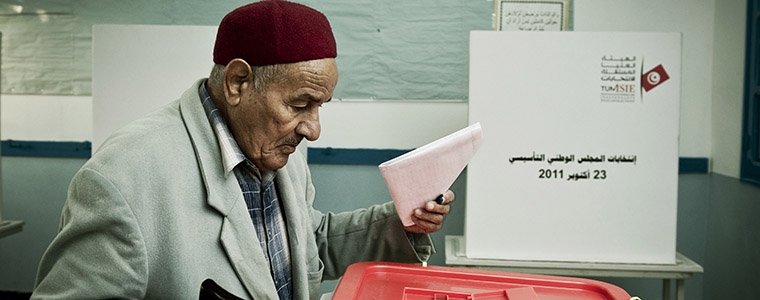Q&A: Lebanese Presidential Elections (published by USIP)
Published:
May 29, 2014
Lebanon’s parliament failed to elect a successor within the constitutional timeframe before President Michel Suleiman’s term expired on May 25. Elie Abouaoun, the director of Middle East programs for the U.S. Institute of Peace, explains the dynamics feeding the divisions, the ramifications of the vacancy and possible solutions.
Lebanon’s internal political and sectarian divisions have deepened precipitously since the outbreak of civil war in neighboring Syria, as refugees from that fighting fled across the border and Lebanese factions took sides in the neighboring conflict. The Lebanese Shia militant group Hezbollah intervened to support Syrian President Bashar al-Assad, while Sunni groups sided with the rebels in Syria.Camp in Lebanon close to the Syrian border. Photo: Elgaard
A group of international officials on May 26 called for an end to the power vacuum by electing a new President and for Lebanon’s leaders to ensure the government of Prime Minister Tammam Salam has the authority to deal with economic, security and humanitarian issues in the meantime.
Has this happened before?
This constitutional milestone is known to polarize political leaders in and around Lebanon and often even international players. So this is not the first time the Lebanese presidential election has created a deadlock. In 12 similar presidential-succession crises since Lebanon became an independent country in 1943, electing a new president proved to be difficult and led to half-baked imposed solutions.
How does a vacancy in the presidency affect the fragile stability in Lebanon?
Because this has happened before and because most regional and international leaders wouldn’t benefit from major upheaval in Lebanon, this latest occurrence isn’t likely to cause a deterioration that would lead to civil war. Even for the most militarized party in Lebanon, Hezbollah, an internal conflict in Lebanon would only divert the group’s resources from the main battle it is leading in support of Bashar Al-Assad’s regime in neighboring Syria and from its overall mandate of fighting Israel. The only game changer for Hezbollah would be if it identifies an internal threat to its existence or operations. Other parties in Lebanon are far from posing such a threat at this stage.
However, the partial paralysis at the legislative and executive levels now could trigger other crises as the existing economic, social and humanitarian (Syrian refugees) challenges worsen.
Why is electing a President so complicated in a nation known to have adopted rather democratic practices compared to the largely authoritarian neighboring countries?
The Presidential election crisis is a symptom of a larger and deep-rooted problem: the formal Lebanese political system is not properly structured for a country of 18 different religious groups and intense identity-based politics. Despite constitutional changes introduced in 1926, 1943 and 1989, the system is largely based on majority rule. But in practice, different parties with different interpretations of legislation can block measures in efforts to strengthen their grip on the power structures. That results in political deadlocks that usually are resolved only through settlements brokered by regional or international powers.
So, the most urgent need for Lebanon now is structural reforms to the political system. Political and civil society leaders should admit that a majority cannot govern Lebanon today with its demographic, social and political diversity. Instead, the constitution should reflect the customary practice used since 1943 and formalize a system based on consensus that would also spell out interim arrangements. Crises might still occur, but their length and intensity might be eased. While the easiest solution would be another quick fix, that would only have a palliative effect until the next crisis erupts.
How do you envisage a new President will be elected?
It is hard to predict. The fate of the Presidency depends on the outcome of the potential talks between Iran and Saudi Arabia. If these discussions do not result in political arrangements (assuming Lebanon is even on the agenda, which is still uncertain), it is likely that another regional mediation will be initiated for Lebanon. Regional intervention in the Lebanese parliament’s selection of a president has always been and will still be a determining factor if the whole Lebanese political system is not revisited.
Are there any top candidates for President and what kind of influence do they have?
None of the top four Christian political figures who have significant constituencies seem likely to win, at least in part because none of them is accepted by both sides on Lebanon’s pro-Iran and pro-Saudi divide. The most likely scenario is that prospective mediators will look for a “compromise” (second-tier) candidate agreed by both Saudis and Iranians. Unfortunately, this means that the next president will have little margin to exercise real authority.
Elie Abouaoun is USIP’s director of Middle East Programs.
